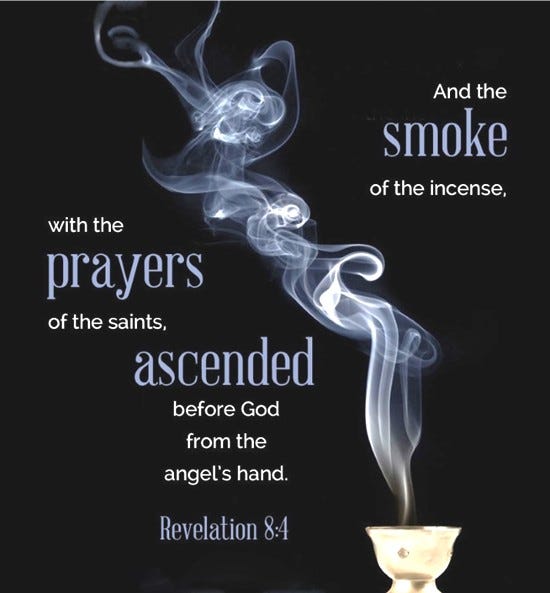incense, in sense
it is primal
When I was at seminary, I attended—and joined—the Presbyterian church across the street from the school. Long story short, I just felt at home. And I also liked the pastor. He said many wise things, but one remark in particular stood out to me. He was lamenting a quality about Presbyterian worship, and he made an observation that was clearly a topic of much contemplation.
I’m paraphrasing a bit, but his comment was that Presbyterian worship depends too much on words. It’s too wordy. It depends too much on reading. (That is sadly ironic, considering the declining level of reading in our country.)
My pastor didn’t elaborate, but my guess would be he longed for a taste of what is (often dismissively) referred to as “smells and bells.”
And I use the word “taste” for a specific reason. Taste is one of the senses all but ignored in that approach to worship. Some would respond, and rightfully so, that without the presence and power of the Spirit, our worship falls flat. Indeed, it does.
Still, haven’t we been created with five senses? Some might argue for more than five. (But we won’t deal with that right now!) Why do we put the others on the shelf when approaching our Creator?
Here’s a story on the sense of taste.
When my wife Banu and I were in our American Baptist Churches seminary, I took a worship class taught by a Presbyterian professor. She gave us an assignment. On the coming Sunday, we were to attend a church with a worship service very different from the one we were used to. There was an Armenian Orthodox church about a mile down the road, so I chose it for my assignment.
The entire service was in the Armenian language, except for the sermon and the prayer of confession, which were in English. Included in their liturgy was the kiss of peace, the holy kiss. The only other people in the pew where I was sitting was a family with a father, mother, and daughter. The daughter looked like she was about 20.
They started down the line, kissing each other on the cheek. Then the daughter started moving toward me; I became a bit nervous. She extended her hand, so a holy kiss turned into a holy handshake. Potential drama averted. If it isn’t already clear, a kiss can quite literally involve the sense of taste!
And taste is center stage in the sacrament at the heart of worship, the body and blood of Christ. Taste the body of Christ—taste bread, not a wafer. Taste the blood of Christ—wine is better than juice!
I am also detecting the sense of smell.
I have long yearned for the pleasingly robust assault on the nasal membranes that invokes a scent of heaven’s doorstep. I’m speaking of incense. One can inhale the sweet smoke pervading from the scriptures. Many instances can be sniffed out, but here are a couple from both testaments of the Bible.
Leviticus 6:15 “And one shall take…a handful of the fine flour of the grain offering and its oil and all the frankincense that is on the grain offering and burn this as its memorial portion on the altar, a pleasing aroma to the Lord.”
Psalm 141:2 “Let my prayer be counted as incense before you and the lifting up of my hands as an evening sacrifice.”
Ephesians 5:2 “Walk in love, as Christ loved us and gave himself up for us, a fragrant offering and sacrifice to God.”
Revelation 8:4 “And the smoke of the incense, with the prayers of the saints, rose before God from the hand of the angel.”
Clouds of burning incense waft their holy power, bearing invocation and supplication to the heavens. They spread a mighty and pleasant bouquet of charisma into the ether. And if it was good enough for the Magi to present to the youngster Jesus, who am I to argue?
But there is another substance producing a wonderful aroma, and it is one often used among the non-“smells and bells” folks: anointing oil.
The Bible makes sure it releases a sweet, fragrant presence. Exodus gives clear instructions for its manufacture. It is described in chapter 30. “The Lord spoke to Moses, ‘Take the finest spices: of liquid myrrh five hundred shekels, and of sweet-smelling cinnamon half as much, that is, two hundred fifty, and two hundred fifty of aromatic cane, and five hundred of cassia—measured by the sanctuary shekel—and a hin of olive oil, and you shall make of these a sacred anointing oil blended as by the perfumer; it shall be a holy anointing oil’” (vv. 22-25).
Sweet-smelling… aromatic… perfume…
Anointing oil represents the Holy Spirit. And as Bill and Gloria Gaither reminded us, “There’s a sweet, sweet Spirit in this place / And I know that it’s the Spirit of the Lord.”
Anointing oil is used for ordination, for consecrating churches, and among other uses, for praying for the sick. James 5:14 states, “Are any among you sick? They should call for the elders of the church and have them pray over them, anointing them with oil in the name of the Lord.”
Returning to the bodily existence, the senses of taste and smell, more than the others, are primal. They unlock parts of our brains that other senses do not. The lizard brain is activated! Long-forgotten memories are resurrected. Echoes arise in dreams.
My pastor back then was right: we Presbyterians are awfully fond of our words. (I imagine some others might see themselves here.) But perhaps we could occasionally set down the bulletin and inhale some incense.
Our lizard brains might just thank us for it—and who knows, they might even help us pray.




